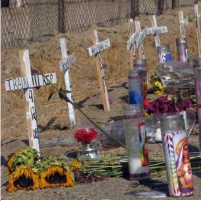Railroad Industry Claims Mandated Safety Technology is Too Expensive
Tuesday, January 24, 2012
 Chatsworth Rail Disaster Memorial
Chatsworth Rail Disaster Memorial
Twenty-one railroad accidents since 2001 could have been prevented with new safety technology that the industry is fighting against adopting. Using GPS, wireless communications and central control centers, Positive Train Control (PTC) automatically applies a train’s brakes when facing a collision or derailment.
The new system was mandated by federal legislation four years ago, after a head-on collision in California in September 2008 killed 25 and injured 135. Safety advocates argue that PTC could have saved those killed near Chatsworth, as well as another 28 people who died in train accidents over the past eleven years.
Railroad companies want to delay implementation of PTC for at least three years, claiming it’s too expensive. They have found a sympathetic ear among Republicans in Congress, and have already won a key concession from the Obama administration regarding the safety technology, reducing the amount of track subject to the system.
The Rail Safety Improvement Act, signed by President George W. Bush on October 15, 2008, required the installation of PTC by the end of 2015, at a cost of $13 billion. Although one government agency, the National Transportation Safety Board, has advocated in favor of PTC, the agency in charge of supposedly enforcing the deadline, the Federal Railroad Administration, has taken the side of the rail industry.
-Noel Brinkerhoff, David Wallechinsky
As Rail Tragedies Fade From Memory, Resistance to Safety Rule Gains Steam (by Justine Sharrock, Laurie Udesky, and Stuart Silverstein, Fair Warning)
- Top Stories
- Unusual News
- Where is the Money Going?
- Controversies
- U.S. and the World
- Appointments and Resignations
- Latest News
- Trump to Stop Deportations If…
- Trump Denounces World Series
- What If China Invaded the United States?
- Donald Trump Has a Mental Health Problem and It Has a Name
- Trump Goes on Renaming Frenzy






Comments